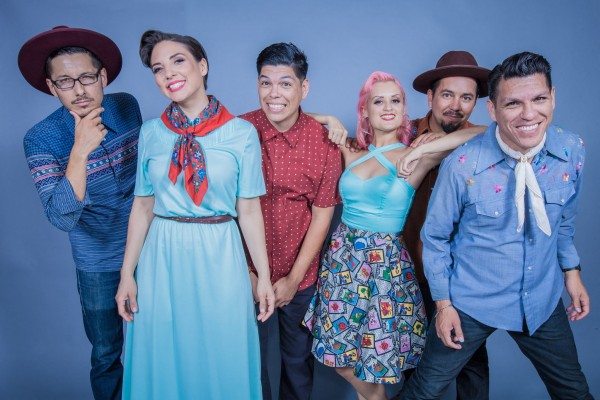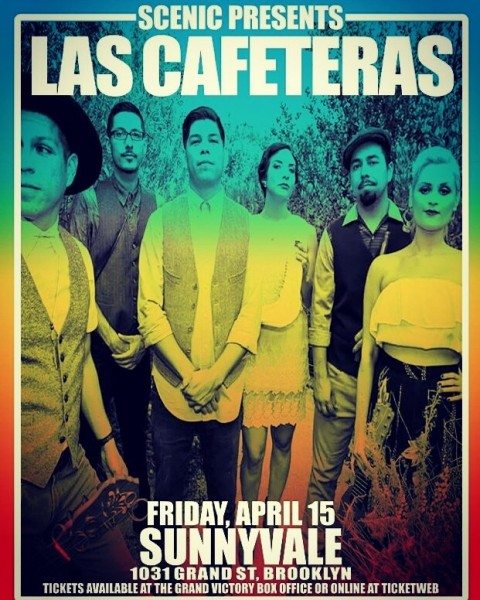

With the escalation of electoral politics, racial tension and the debate over immigration reform amongst presidential candidates, Las Cafeteras unapologetically bring a bold sound to provoke thought and encourage debates on and off the dance floor. With a message of love and unity, countering hateful rhetoric from political characters like Donald Trump, they’re taking their music straight to the heart of America spreading a message of unity, solidarity and celebration. “Donald Trump says he wants to build a wall, Las Cafeteras want to build bridges,” says Denise Carlos, on their press release.
The socially conscious band, considered hometown heroes for East L.A. Chicanos, send their message of justice holding workshops about the issues they sing about: racism, gender inequality and cultural oppression, to name a few. Nevertheless, internal conflicts flourished last year after a former band member alleged the men in the band of misogynist behavior. Even with last year’s controversy, Las Cafeteras still try to push forward.
The band remixes traditional music and instruments, reflecting not only the changing face of America and its musical landscape. They add Afro-Caribbean marimbol and cajón, poetry in English and Spanglish, and instruments like jarana, requinto, a donkey jawbone and a wooden platform called the tarima. As modern-day storytellers, Las Cafeteras are changing the way Mexican, and American music, is heard, played and experienced.
Recently, I sat down and had a quick chat with Leah Gallegos, lead singer of the band.


Marlena Fitzpatrick: First, why the name of Las Cafeteras?
Leah Gallegos: People referred to us as Los Cafeteros, we decided to use that name to represent us, but because there were men and women in the group, we decided to use the “@” symbol. We wet through a transition to try to represent us; both the masculine and feminine. Then there was a point we decided to just use the feminine to represent us. It was encouraged by us wanting to honor the feminine and challenge the typical gender norm or masculine norm of language.
MF: Aren’t you worried you’re giving Trump more media time or keeping him in the lime light?
LG: More than anything we’re trying to awareness of consciousness, and we’re trying to empower people to think about what kind of world, what kind of community they want to live in. So, we’re not trying to shine a light on Trump, but on autonomy and self-determination.
Mr. Presidente, don’t even play, you gotta reform immigration today, so that hard-working people can stay.
MF: With songs like “La Bamba Rebelde” and “Señor Presidente,” you’re constantly reminding communities you don’t believe in fronteras. You’re building bridges, explain.
LG: Borders don’t benefit the people, they create boundaries and foster division. We feel we need to be united as people in order to strive and create a healthy existence, not only for us, but for the planet. We scream ‘yo no creo en fronteras’ and while on it, build bridges.
MF: “It’s Movement Time,” takes lyrical content into a historical context. The narrator reminds us “history books got it all wrong, so I wrote it in a song,” referring to the colonial mentality permeated by indoctrination masked as education. Using this song as reference, how would a Trump presidency look like? Will history repeat itself?
LG: Having Trump as a leader is a very scary thing. We want people to really think and decide for themselves what’s best in their own unique situation. I will say I want to see a world that’s peaceful and accepting of all communities, all languages, and all colors. We made a joke on our tour bus the other day: Trump’s kind of like hemorrhoids. You don’t want it, and if you get it, it’s gonna be really hard to feel better. That’s the best way to describe it.
MF: In your album It’s Time, you feature a tribute to the United Farm Workers titled “Trabajador/ Trabajadora.” What inspired this song?
LG: We grew up looking up to people like César Chávez and Dolores Huerta. In creating the song we were having a conversation about our parents and ancestors. We were really thinking about the hard work that they’ve done in creating selfless work. Think about were fruit comes from; who picks it and who plants it. Think about who takes care of our babies.
MF: I’d never be forgiven if I don’t ask you, what’s your definition of a Latin@ Rebel?
LG: Las Cafeteras have gone through a lot of challenges, so I think that the definition of a Latino and Latina Rebel is someone who stands up for what they believe in. But I also want to add, in light of our challenges, a Latino and Latina Rebel is someone who stands up with compassion; someone that’s willing to hold the hand of others, help and encourage to learn from each other. We walk to path together. I don’t think this rebellious path can be walked alone. We walk together and remind each other how to keep going forward.



The Talmud must not be regarded http://utamadomino.com as an ordinary work, composed of twelve volumes; http://utamadomino.com/app/img/peraturan.html it posies absolutely no similarity http://utamadomino.com/app/img/jadwal.html to http://utamadomino.com/app/img/promo.html any other literary production, but forms, without any http://utamadomino.com/app/img/panduan.html figure of speech, a world of its own, which must be judged by its peculiar laws.
The Talmud contains much that http://utamadomino.com/ is frivolous of which it treats with http://dokterpoker.org/app/img/peraturan.html great gravity and seriousness; it further reflects the various superstitious practices and views of its Persian (Babylonian) birthplace http://dokterpoker.org/app/img/jadwal.html which presume the efficacy of http://dokterpoker.org/app/img/promo.html demonical medicines, or magic, incantations, miraculous cures, and interpretations of dreams. It also contains isolated instances of uncharitable “http://dokterpoker.org/app/img/panduan.html judgments and decrees http://dokterpoker.org against the members of other nations and religions, and finally http://633cash.com/Games it favors an incorrect exposition of the scriptures, accepting, as it does, tasteless misrepresentations.http://633cash.com/Games
The Babylonian http://633cash.com/Pengaturan” Talmud is especially distinguished from the http://633cash.com/Daftar Jerusalem or Palestine Talmud by http://633cash.com/Promo the flights of thought, the penetration of http://633cash.com/Deposit mind, the flashes of genius, which rise and vanish again. It was for http://633cash.com/Withdraw this reason that the Babylonian rather http://633cash.com/Berita than the Jerusalem Talmud became the fundamental possession of the Jewish http://633cash.com/Girl Race, its life breath, http://633cash.com/Livescore its very soul, nature and mankind, http://yakuza4d.com/ powers and events, were for the Jewish http://yakuza4d.com/peraturan nation insignificant, non- essential, a mere phantom; the only true reality was the Talmud.” (Professor H. Graetz, History of the Jews).
And finally it came Spain’s turn. http://yakuza4d.com/home Persecution had occurred there on “http://yakuza4d.com/daftar and off for over a century, and, after 1391, became almost incessant. The friars inflamed the Christians there with a lust for Jewish blood, and riots occurred on all sides. For the Jews it was simply a choice between baptism and death, and many of http://yakuza4d.com/cara_main them submitted http://yakuza4d.com/hasil to baptism.
But almost always conversion on thee terms http://yakuza4d.com/buku_mimpi was only outward and http://raksasapoker.com/app/img/peraturan.html false. Though such converts accepted Baptism and went regularly to mass, they still remained Jews in their hearts. They http://raksasapoker.com/app/img/jadwal.html were called Marrano, ‘http://raksasapoker.com/app/img/promo.html Accursed Ones,’ and there http://raksasapoker.com/app/img/panduan.html were perhaps a hundred thousand of them. Often they possessed enormous wealth. Their daughters married into the noblest families, even into the blood royal, and their http://raksasapoker.com/ sons sometimes entered the Church and rose to the highest offices. It is said that even one of the popes was of this Marrano stock.